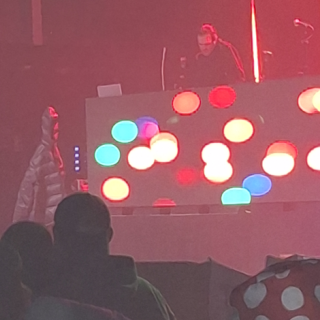Advertisement
As we come to the close of Black History Month, may we add a special one-time Lifetime Cosmic Eternity award for Greatest Electric Psychedelic Black Man with Cherokee Blood, namely Mr. Sir Jimi Hendrix?
Inarguably Jimi's blackest album in the traditional Afro-American music stylings would be Band of Gypsies, with Jimi's super-soul power drummer Buddy Miles and Jimi's old army buddy on bass, the very supple and dependable Billy Cox. It was Jimi's psychedelic blues-funk-soul with the particularly tremendous song, “Message of Love,” carrying a gospel-like under-groove as well as message of positivity.
What his recent collection, Valleys of Neptune, made clear was Hendrix was indisputably the greatest funk guitarist who ever lived. The compilation of late period-Hendrix--mostly funk-meets-soul with his outer limits blues playing--is entirely of studio material and sound great. Band of Gypsies is Jimi playing similar material live and on fire, it was a special New Year's Eve/New Year's Day quartet of performances and the dvd of it is utterly, unbelievably, unfathomably amazing. The actual album--usually six songs though imports tend to have a seventh, the Howard Tate soul classic, “Stop,” and very worth seeking out.
But let's rock “Message of Love.”
It opens with an exhilarating pile of upward climbing funk chords, Jimi's guitar matched by Buddy and Billy, working its way up Jimi's Stratocaster neck. Power! Practically a funk-country-soul guitar riff pours chunkily out of Hendrix's chording hand. "Well, I travel at a speed of a reborn man/I gotta lotta love to give/from the mirrors in my hand." Brilliant! Weird! Acidic!
His lead guitar breaks in after the lyric, doing what the chords did but with single strings, building the house that Hendrix would then set on fire with his solo. Another verse, the chorus and then one of the most lightning-filled electric solos Hendrix ever tossed off. Fuzz-pedal-meets-wah-wah-meets-whammy-bar-on-the-guitar and the tone sears the brain.
"I am what I am....thank God," he talk/sings.
It dances on top after a few riffing moments lower on the neck. His fingers doing the ballet minuet and quickly, the notes tickling the atmosphere before he drags them down to the lower, thicker strings with a very husky, macho feel almost like Ennio Morricone spaghetti-western sauce. Jimi's, though, has got funk and electric blues pouring out from under the fingernails of his long magical mystery fingers, each one unleashing a wizard's spell of multi-colored steel-string electrified guitar notes.
Fire. Electric. Fire electric, Hendrix was his own power source.
After the tingling, killing solo winds its way back to earth having scorched the heavens on its way down, he hits a particularly hooky funk riff not out of place in the song but completely off the cuff. It sounds like Sly Stone being chased by the San Francisco police, hitting ghetto groove and then straightening up and going to church when the backing vocals of Billy and Buddy chime in, very Sunday morning-ish.
Before I finish up about the solo, a word on the sheer wall of energy vulcanizing out of the trio. The beat is as strong as anything Miles ever played--pounding like the most furious Baptist minister to ever sit at the kit. Billy Cox's bass is utterly important, flowing with and building the foundation of the song with Buddy as strong as the tablets of Moses.
Not tabs of Owlsey--tablets of Moses. This, after all, is the world's most amazing outlaw gospel tune, going the way of a levitating holy man blasting of from both the Ganges and the Mississip. Like the album cover to Axis: Bold as Love, Jimi had feet and toes and hands and legs in many worlds.
And also not last and most certainly not least: the sheer joy of “Message of Love.” Soul thrilling and so very, very danceable.
OK, we're coming out of the solo--Billy and Buddy stop playing. Jimi's doin' his Sly Stone imitation on guitar, "Everybody come alive, everybody hear my message," and then voomp! He's into a soul-gospel guitar solo again, stabbing Jesus with nine-inch-nails of wild man of Memphis lead guitar. And then he uses the intro and climbs his way out of the song, adding some one-handed playing to make it a whisper of an ending, not a bang.
Side two of Band of Gypsies is one of the most radical guitar movements in two parts since Beethoven busted his butler for transposing his Ninth Symphony for Segovia: “Who Knows” and “Machine Gun” are two of the weirdest, most insanely intuitively genius guitar extravaganzas
channeling John Coltrane and free jazz ever recorded.
Jimi made Band of Gypsies in part because he'd been criticized by The Black Power Movement for not being 'black enough', for having white British musicians on drums and bass as part of the
Experience. A stupider charge has never been leveled. But I must admit, for whatever reasons Hendrix saw fit to take a break from touring and playing the hits, which was depressing and exhausting him, Band of Gypsies stands as one of the most fantastic soundtracks of time (the true end of the '60s), place (America, Fillmore East, NYC) and space (Jimi's mind).
I still miss him.



